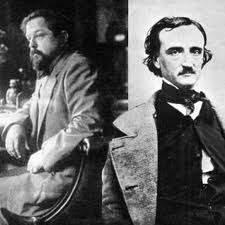Written by Harry Clark
Music by Debussy
2M: Edgar Allan Poe, Claude Debussy
1M: pianist in performance of select Debussy Preludes
“The question is not yet settled, whether madness is or is not the loftiest intelligence—whether much that is glorious—whether all that is profound—does not spring from disease of thought—from moods of mind exalted at the expense of the general intellect.” Edgar Allan Poe
“House of Usher is not a place where one can look after one’s nerves—just the opposite. One develops the curious habit of listening to the stones as if they were in conversation with one another and of expecting houses to crumble to pieces as if this were not only natural but inevitable.” Claude Debussy on composing his opera based on Poe’s House of Usher
A dear friend of mine, James Reel, asked me if I was aware of Claude Debussy’s obsession with Edgar Allan Poe. I had no idea, but asked if Poe was France’s 19th-century answer to Jerry Lewis in modern times. More so, he answered, and so off I went to find out about this unlikely pairing, Claude and Edgar Allan.
Sure enough, Debussy was mad for Poe and died while sketching scenes for the opera House of Usher. As a young man he had abandoned an opera on the Devil in the Belfry.
What was the reason for Debussy’s madness? Charles Baudelaire can take a great deal of the blame or credit. He, too, became unglued with Poe’s short stories and spent his last years translating Poe’s tales. He was fascinated with Poe’s straightforward use of events to create impressions of modernity. Poe’s Man of the Crowd exhibited this modernity comparing the different responses of different classes of people having their paths obstructed on a busy street. In his words: The businessmen evinced no symptoms of impatience, but adjusted their clothes and hurried on, while others redoubled their gesticulations, and awaited, with an absent and overdone smile upon the lips, the course of the persons impeding them. If jostled, they bowed profusely to the jostlers, and appeared overwhelmed with confusion.
What a grand idea to put Edgar Allan and Claude together and see what impressions they’d make on one another. I chose a dozen or so of Debussy’s impressionistic modernities, his piano Preludes, as interludes, interjections, between the short vignettes.

